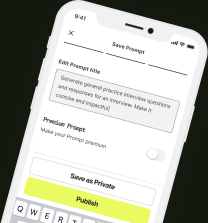prompt mine App
Find, Create & Share AI Magic
How to Design a Daily Routine That Promotes Lifelong Learning and Continuous Self-Improvement
Alright, let's craft a daily routine designed to be a catalyst for lifelong learning and continuous self-improvement. This isn't a rigid template, but a flexible framework. Remember, the key is to adapt it to *your* specific needs, goals, and energy levels. Consistency is more crucial than perfection, so start small and build momentum.
**The Foundation: Principles for Lifelong Learning & Self-Improvement**
Before we dive into the schedule, let’s establish the core principles that underpin this routine:
* **Intentionality:** Every activity should be chosen with a purpose and aligned with your overall goals.
* **Reflection:** Regularly reflecting on your experiences, progress, and setbacks is crucial for learning and growth.
* **Adaptability:** Life happens. Be prepared to adjust the routine as needed to accommodate changes and challenges.
* **Balance:** A well-rounded routine incorporates intellectual, emotional, and physical well-being.
* **Self-Compassion:** Be kind to yourself. Learning and growth are journeys, not destinations.
**The Daily Routine: A Suggested Schedule**
This schedule is designed to be adaptable, fitting into your existing work schedule, family commitments, and personal preferences. The times are suggestions; adjust them to suit your needs.
**Morning (6:00 AM - 9:00 AM - Adjust to Your Wake-Up Time)**
* **6:00 AM - 6:15 AM: Mindful Movement/Meditation (15 minutes)**
* **Activity:** Start the day with gentle stretching, yoga, a brisk walk, or a guided meditation. Focus on your breath and body.
* **Purpose:** Ground yourself, increase blood flow, and set a positive tone for the day.
* **6:15 AM - 6:45 AM: Deep Reading (30 minutes)**
* **Activity:** Dedicate this time to reading something related to your personal or professional development goals. This could be a book, a relevant article, or an industry report.
* **Purpose:** Expand your knowledge, challenge your thinking, and learn from experts in your field.
* **6:45 AM - 7:00 AM: Gratitude & Intention Setting (15 minutes)**
* **Activity:** Journaling. Write down 3-5 things you're grateful for and 1-3 intentions for the day. What do you want to accomplish? How do you want to feel?
* **Purpose:** Cultivate a positive mindset and clarify your priorities.
* **7:00 AM - 7:30 AM: Skill Development (30 minutes)**
* **Activity:** Engage in a focused learning activity related to a specific skill you want to develop. This could be coding, learning a new language, practicing a musical instrument, or working on public speaking. Use online courses, apps, or practice materials.
* **Purpose:** Acquire new skills, boost your confidence, and expand your capabilities.
* **7:30 AM - 8:00 AM: Fuel Up & Prepare for the Day (30 minutes)**
* **Activity:** Prepare a nutritious breakfast and get ready for work/other commitments.
* **Purpose:** Nourish your body and mind to ensure you start the day strong.
* **8:00 AM - 9:00 AM: Plan & Prioritize (60 minutes - if you need less, use this time for something else)**
* **Activity:** Review your to-do list, calendar, and goals. Identify the 2-3 most important tasks for the day and schedule them into your calendar. Use a productivity system like Getting Things Done (GTD) or the Eisenhower Matrix.
* **Purpose:** Gain clarity, focus your energy, and ensure you're working on the things that truly matter.
**Mid-Day (During Lunch Break/Short Breaks)**
* **(15-30 minutes): Micro-Learning/Mind Recharge**
* **Activity:** Listen to a podcast episode, watch a short TED Talk, read a chapter in a book, or take a few minutes for a mindful breathing exercise.
* **Purpose:** Inject small bursts of learning and mental rejuvenation into your day.
**Evening (6:00 PM - 9:00 PM)**
* **6:00 PM - 7:00 PM: De-Stress & Unwind (60 minutes)**
* **Activity:** Engage in activities that help you relax and de-stress. This could be spending time with loved ones, listening to music, taking a bath, reading a novel (for pleasure), or pursuing a hobby.
* **Purpose:** Recharge your batteries and prevent burnout.
* **7:00 PM - 7:30 PM: Active Recall/Note Review (30 minutes)**
* **Activity:** Review the notes you took during the day, or try to recall key information you learned. Use active recall techniques like spaced repetition or the Feynman Technique.
* **Purpose:** Reinforce learning and improve memory retention.
* **7:30 PM - 8:00 PM: Reflection & Journaling (30 minutes)**
* **Activity:** Reflect on your day. What went well? What could have been better? What did you learn? Write down your thoughts and insights.
* **Purpose:** Process your experiences, identify areas for improvement, and gain valuable self-awareness.
* **8:00 PM - 8:30 PM: Next Day Planning/Evening Routine (30 minutes)**
* **Activity:** Prepare for the next day. Lay out your clothes, pack your lunch, and review your schedule. Create a wind-down routine to promote restful sleep (e.g., reading, gentle stretching, avoiding screens).
* **Purpose:** Minimize morning stress and ensure a smooth start to the next day.
* **8:30 PM - 9:00 PM: Relaxation/Prepare for Sleep (30 minutes)**
* **Activity:** Engage in activities that promote relaxation and restful sleep, such as reading a calming book, listening to ambient music, or practicing deep breathing exercises.
* **Purpose:** Prepare your mind and body for sleep, improving sleep quality.
**Weekly Review (e.g., Sunday Evening - 1-2 hours)**
* **Activity:** Review your progress towards your goals. What did you accomplish this week? What challenges did you face? What adjustments do you need to make to your routine or goals? Celebrate your successes and learn from your setbacks.
* **Purpose:** Stay on track, identify areas for improvement, and maintain momentum.
**Time Management Tips for Effective Implementation**
* **Time Blocking:** Schedule specific time slots for each activity in your calendar. Treat these appointments as non-negotiable.
* **Prioritization:** Use a system like the Eisenhower Matrix (Urgent/Important) to prioritize tasks. Focus on high-impact activities.
* **Batching:** Group similar tasks together to minimize context switching. For example, dedicate a block of time to reading all your articles or responding to all your emails.
* **The Two-Minute Rule:** If a task takes less than two minutes, do it immediately.
* **Eliminate Distractions:**
* **Turn off notifications:** Disable notifications on your phone and computer during focused work sessions.
* **Use website blockers:** Block distracting websites like social media during work hours.
* **Create a dedicated workspace:** Designate a specific area in your home as your workspace.
* **Inform others:** Let your family or colleagues know when you need uninterrupted time.
* **Stay Motivated:**
* **Set SMART Goals:** Make sure your goals are Specific, Measurable, Achievable, Relevant, and Time-bound.
* **Track Your Progress:** Use a journal, spreadsheet, or app to track your progress towards your goals. Seeing your progress can be a powerful motivator.
* **Reward Yourself:** Celebrate your successes with small rewards. This could be anything from a relaxing bath to a weekend getaway.
* **Find an Accountability Partner:** Partner with someone who shares similar goals and hold each other accountable.
* **Focus on the "Why":** Remind yourself why you're pursuing your goals. Connect your daily activities to your long-term vision.
* **Embrace the Process:** Enjoy the journey of learning and growth. Focus on the process rather than solely on the outcome.
**Key Takeaways:**
* **Customize:** This is a framework, not a prescription. Tailor it to *your* unique needs and goals.
* **Start Small:** Don't try to implement everything at once. Start with 1-2 key activities and gradually add more as you build momentum.
* **Be Consistent:** Consistency is more important than perfection. Aim to stick to your routine as much as possible, even on busy days.
* **Be Patient:** Learning and growth take time. Don't get discouraged if you don't see results immediately.
* **Reflect and Adjust:** Regularly review your routine and make adjustments as needed. What's working? What's not? What can you improve?

Find Powerful AI Prompts
Discover, create, and customize prompts with different models, from ChatGPT to Gemini in seconds

Simple Yet Powerful
Start with an idea and use expert prompts to bring your vision to life!

